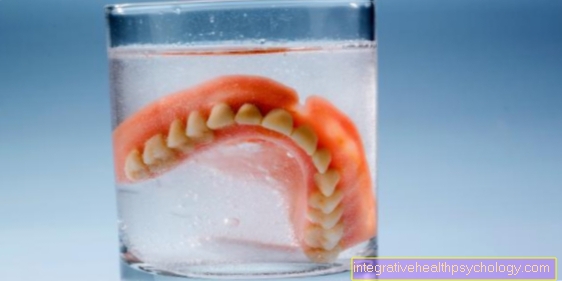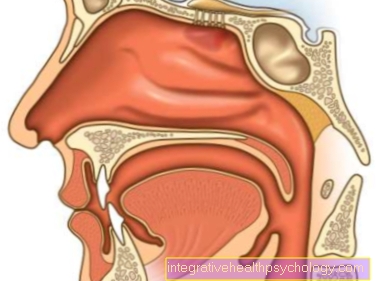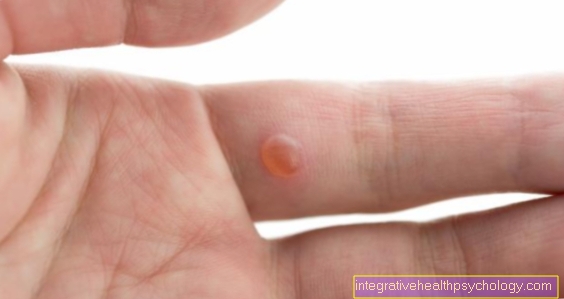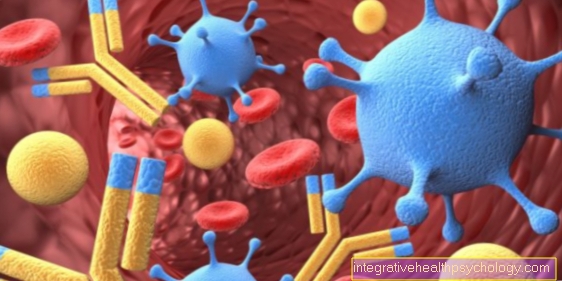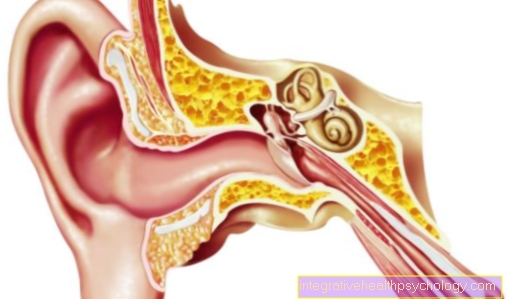Lymph node swelling on the neck - how dangerous is it?
introduction
Lymph nodes are part of the body's defense system. They are a filter station in which the lymph is cleaned. Lymph is also called tissue water. On the one hand, it transports nutrients and waste materials, and on the other hand, it is also responsible for the disposal of pathogens.
In most healthy people, lymph nodes can only be palpated in the groin, in children or slender necks also in the neck region. If lymph nodes are swollen in the neck area, they can often be felt under the chin, on the side of the neck, behind the ear or below the earlobe. There are many causes of lymph node swelling in the neck, most of which are harmless. The most common cause is a reaction of the lymph nodes to a cold. If swelling of the cervical lymph nodes persists for more than two weeks, a doctor should be consulted to be on the safe side.

CAUSES of swelling of the lymph nodes in the neck
The lymph nodes play a central role in the body's defenses. If there are foreign bodies or pathogens in the body, the lymph nodes produce lymphocytes (white blood cells) and antibodies. These are released into the blood, where they then fight the pathogen or foreign body. The production of these cells can cause the lymph node to swell. Thus, a swelling of the lymph nodes gives an indication that this is in an active state.
A common cause of swelling of the lymph nodes in the neck is infection, usually inflammation of the throat and tonsils. These are caused by viruses, bacteria or parasites. The most common are infections caused by viruses, which are accompanied by cold symptoms such as sore throat, cough, runny nose and difficulty swallowing. Pfeiffer's glandular fever is also common in younger people. In addition to sore throats and headaches, fever and swelling of the lymph nodes in the neck and neck area, lymph nodes in other parts of the body often swell. The "teething troubles" measles and rubella are also often accompanied by swelling of the lymph nodes in the neck. It is important to know here that the diseases can be prevented by vaccination. If you are not vaccinated you can get these diseases at any age and not just as a child.
Read more on the topic: Lymph node swelling after surgery
Lymph node swelling with a cold
A cold occurs when the respiratory tract is infected by a variety of possible viruses. In addition to the typical symptoms such as cough, runny nose and aching limbs, the common cold is the most common cause of lymph node swelling in the neck. It is a natural reaction of the body, as the immune system deals with the pathogen and produces specific defense cells in the lymph nodes that are directed against this pathogen.
It is typical for lymph node swellings in such a case that they cause pain when touching. As the swelling heals, the swelling usually recedes. In some cases, swollen lymph nodes on the neck can remain swollen for several weeks after the cold. This does not have to indicate a dangerous illness, but should be examined by a doctor to be sure.
Lymph node swelling caused by bacteria
Diseases caused by bacteria can also lead to swelling of the lymph nodes in the neck. Diseases caused by streptococci such as throat and tonsillitis (angina) and scarlet fever. They usually need penicillin treatment.
Tuberculosis typically starts in the lungs. However, if the pathogen spreads, it can also reach the lymph nodes. Lymph node tuberculosis usually manifests itself as swelling of the lymph nodes in the neck and collarbone. Even if the frequency of the disease is currently increasing, it is rare in Germany overall.
Lymph node swelling from an allergy
Lymph node swellings in the neck can often also be triggered by certain allergies. People with hay fever in particular suffer from enlarged and hardened lymph nodes during the pollen season. They are a sign of the overreaction of the immune system to the harmless bee pollen or grass. If the lymph node swelling in the neck is triggered by an allergy, the typical other symptoms also occur, such as burning eyes, runny nose and sneezing.
If only swelling occurs, it is more likely not a consequence of the allergy.
Lymph node swelling after vaccination
Lymph node swelling in the neck cannot usually be caused by vaccination. Reactions of the immune system to a vaccination are normal or even desirable. Lymph node swelling is a reaction of the immune system, but vaccination is usually given in the upper arm or, in small children, in the thigh.
In both cases, swelling of the lymph nodes in the neck as a result of the vaccination is very unlikely. A temporal connection to the vaccination is therefore most likely coincidental and the swollen lymph nodes on the neck have another cause, such as an infection.
For detailed information on this topic, see: Lymph node swelling after vaccination
Lymph node swelling due to tooth inflammation
Since swelling of the lymph nodes often occurs as a response of the body to inflammation, it can also come from an inflammation of the teeth. If the swelling occurs in connection with a toothache, this is very likely. As a rule, lymph nodes in the neck also swell on the side of the body where the tooth is inflamed.
If the tooth inflammation is treated, the lymph node swelling should also decrease. If this is not the case or if the swelling increases despite the improvement in the toothache, an examination by the family doctor should be carried out as soon as possible in order to rule out other causes.
Lymph node swelling after a tick bite
Not every tick bite leads to an infection. In most cases you don't get sick. This can only happen if there were pathogens in the tick's body and they could also penetrate the human blood. However, if lymph node swellings appear on the neck after a tick bite, this can be a sign of an incipient disease (for example borreliosis).
A connection between swelling of the lymph nodes on the neck and a tick bite is particularly possible if the tick has settled in the head or neck area. To be on the safe side, a doctor should be consulted to rule out an infection or, if necessary, to start treatment early.
You can find more information on the topic here: Symptoms of Lyme Disease
Can swelling of the lymph nodes in the neck arise from tension?
Tension does not lead to swelling of the lymph nodes. If nodular enlargements can be felt on the neck as part of tension, this is usually not lymph node swelling. The tension can cause hardened muscle fibers to appear, which can be mistaken for lymph nodes.
Once the tension improves, these hardenings should also disappear again. Nevertheless, due to an additional cause, for example triggered by a cold, swollen lymph nodes in the neck can also occur with tension.
The topic may also be of interest to you: How can you best relieve neck tension?
Can that be an indication of cancer?
A swelling of the lymph nodes in the neck occurs in most cases as a result of an infection of the upper respiratory tract or an inflammation in the throat. However, swelling of the lymph nodes in the neck can also be an indication of cancer.
Typically, this leads to a progressive (progressive) swelling of the cervical lymph nodes. The swelling is often not associated with infections. In addition, the swollen lymph nodes in cancer are harder than in swelling due to infections, and the swollen lymph nodes are usually not tender.
What else can be an indication of cancer? For more symptoms, check out our next article at: These symptoms indicate throat cancer
Can that be an indication of HIV?
HIV is an immune system disease that can be caused by a viral infection. In the early stages of infection, there may be pronounced swelling of the cervical lymph nodes. This is followed by a long period in which the disease does not make itself felt.
This phase can last from a few months to several decades.In the final stage of the disease, lymph node swelling can occur again, which can generally be expressed in all parts of the body.
You can find more information about the topic at: Symptoms of HIV
Other possible causes
The thyroid is located on the front of the neck. For this reason, diseases of the thyroid gland, such as inflammation or thyroid cancer, can cause a reaction, i.e. swelling of the lymph nodes in the neck. In addition, swelling of the thyroid gland can also manifest itself.
The salivary glands are also located near the neck, so that inflammation of these glands is also often associated with swelling of the lymph nodes in the neck. Due to their anatomical location, inflammation of the teeth and / or the gums can also be the cause of swelling of the lymph nodes in the neck area.
Another rather rare cause of lymph node swelling in the neck area is the presence of a lymphoma, a cancer in which the lymphocytes are affected. This is often associated with fever, night sweats, and weight loss. The connective tissue disease sarcoid can also lead to swollen lymph nodes in the neck. Characteristic are small, nodular tissue changes that mostly affect the lungs. This can then lead to chronic dry cough and shortness of breath.
Different LOCALIZATIONS
Unilateral swelling of the lymph nodes
The acute and usually painful swelling of the cervical lymph nodes occurs with infections of the airways (nose and throat). In addition to bacteria, viruses also play a role in this clinical picture.
Due to the decreasing willingness to vaccinate and many opponents of the vaccine, whooping cough can also be a triggering underlying disease. In rare cases, lymph node involvement in so-called toxoplasmosis is also limited to the neck region.
It is important to think of lymph node tuberculosis in the event of unilateral swelling of the lymph nodes. This disease is chronic and the lymph nodes are not painfully changed.
Other mycobacteria can also cause lymph node swelling or inflammation. Lymph nodes swollen on one side on the neck can occur in locally limited processes. This includes inflammation of the skin, oral mucosa, certain teeth or ears. To make this clear, two examples: Right-sided tooth inflammation is most likely to result in right-sided lymph node swelling. If you have an ear infection on the left side, there will be lymph node swelling on the left side of the neck.
In the case of swelling that is limited on one side, if it persists for more than 2-3 weeks, a blood test should be carried out or the lymph nodes should be examined via biopsies to rule out malignant causes. In addition to malignant processes, lymph node tuberculosis is also a possibility. These processes need to be clarified.
Bilateral lymph node swellings
In the case of respiratory infections, which are the most common cause of swelling of the lymph nodes in the neck, this occurs in most cases on both sides. With other infections, such as tonsillitis, bilateral swollen lymph nodes are more the rule.
A malignant disease is very unlikely with bilateral swollen lymph nodes in the neck, especially if the swellings are symmetrically distributed.
Lymph node swelling in the neck and groin
There are many lymph nodes in the groin area as a natural part of the body's defense system. Some of them can even be felt when they are not enlarged. If there is a simultaneous enlargement of the lymph nodes in the neck and in the groin, this can have different causes.
Most often there is an infectious disease. Autoimmune diseases can also lead to enlarged lymph nodes all over the body. In some cases, a malignant disease can also be the cause. Even if this explains the lymph node enlargement in rare cases, a medical examination should be carried out.
A doctor should also be consulted if there has recently been unprotected sexual contact apart from a partnership. Some sexually transmitted diseases, such as fungal infections, can show up as swollen inguinal lymph nodes. In such a situation, a possible infection with the HI virus (trigger of AIDS) should also be ruled out, as lymph node swelling can also occur a few weeks after infection.
You can find more information on the topic here: Lymph node swelling- What evidence is there that it is HIV? or symptoms of AIDS
Lymph node swelling in the neck and neck
Lymph node enlargement can occur all over the body. In the case of respiratory infections, swelling of the lymph nodes in the neck is also possible in the neck. As with all lymph node enlargements, it is a normal reaction of the immune system in the event of an infection and usually disappears on its own after healing.
If this does not happen, or if lymph node enlargement occurs in the neck and neck without an infection, a doctor should be consulted. This is especially true if the lymph nodes feel hard and do not cause pain when you press them.
Lymph node swelling in the neck and ear
Swollen lymph nodes on or around the ear can occur if there is inflammation in the area of the ear. These include inflammation of the externally visible ear but also otitis media and inner ear infection, which are not visible but can cause severe pain and dizziness.
Lymph node swellings on the neck that occur at the same time or with a slight delay are also possible. Likewise, swollen lymph nodes in the neck and ear can also occur with all sorts of other infections in the head and neck area, such as sinusitis with a cold. Lymph nodes that are swollen on one side and that cannot be moved and do not cause pain when touching should be examined by a doctor.
Lymph node swelling in CHILD
Lymphatic swelling in the neck of children is a very common natural defense reaction and is rarely a cause for concern. In children, the immune system has yet to develop, as it repeatedly comes into contact with previously unknown pathogens. Therefore, children who have a cold or, for example, tonsillitis, often develop particularly pronounced swelling of the lymph nodes in the neck.
The Pfeiffer glandular fever (medical: mononucleosis) caused by the Ebstein-Bar virus is a typical example. But even a normal flu-like infection can be enough to make the cervical lymph nodes swell significantly. If the disease heals, the swelling of the lymph nodes usually also recedes.
In children who have not been vaccinated, swelling of the lymph nodes in the neck can also be a sign of diseases such as mumps, measles, or rubella.
Another rather rare disease that typically occurs in children with enlarged lymph nodes on the neck is Kawasaki syndrome. This vascular inflammation usually results in a severe fever and inflammation of the throat and conjunctiva of the eye. Certain medications can also cause swelling of the lymph nodes in the neck in children.
Unilateral swelling of the lymph nodes on the neck, even in children, most likely indicates a defense reaction against inflammation in the adjacent area (mouth, nose, throat). These lymph node swellings are a side effect of common infections. In these cases, the lymph nodes are tender on pressure, can be easily moved and they can possibly be directly related to a visible or noticeable illness (e.g. cold with runny nose and sore throat).
As a rule, the lymph nodes should swell again after the offending infection has subsided. Local infections, for example the oral mucosa, the teeth, the skin in general or in the ear, nose and throat area usually trigger unilateral swelling of the lymph nodes in the neck, even in children. The infections are usually triggered by bacterial pathogens, so antibiotic therapy is indicated in some cases. After the underlying disease has healed, the lymph node swelling should also decrease.
In some cases, inflammation of the lymph nodes can also be responsible for the swelling. This Lymphadenitis occurs only in one place and is associated with reddened skin and fever. In this case, a pediatrician should be consulted, because the lymph node inflammation must be treated with antibiotics and in rare cases the lymph nodes must be surgically removed.
It is a special disease Kawasaki Syndromewhich describes inflammation of the blood vessels. In addition to the swelling of the lymph nodes in the neck, a high fever occurs for several days. In addition, the lips are red and cracked. The redness can also be found on the eyes, palms, and soles of the feet. In this case, a doctor should be consulted immediately, the children often have to be hospitalized and given blood-thinning drugs and immunoglobulins (antibody) be treated.
Numerous pathogens trigger generalized swelling of the lymph nodes throughout the body, which of course also affects the cervical lymph nodes. Such generalized lymph node swellings can occur especially in children with infections with the childhood diseases measles and rubella.
EBV and CMV viruses also cause the same symptoms.
Malignant abnormalities of the lymph nodes (lymphomas, malignancies), in which the lymph nodes are swollen in several places, not just on the neck, are less common.
You can find detailed information on this topic at: Lymph node swelling in the child
Lymph node swelling in PREGNANCY
Lymph node swellings in the neck are also most common in pregnant women as part of an infection of the respiratory tract or throat.
Toxoplasmosis is a rare but very dangerous possible cause of lymph node swelling in the neck or other body regions during pregnancy. The disease is caused by parasites and is usually transmitted through cat excretions or raw meat. You can also become infected while gardening, as the pathogens can be in the ground. Therefore, pregnant women should avoid contact with cats and not do gardening. Raw meat such as pork meat or tartare should not be consumed until the end of pregnancy. If swelling of the lymph nodes appears in the neck without a cold being the trigger, a doctor should be consulted to be on the safe side. In most cases, it can safely rule out a toxoplasmosis infection.
You might also be interested in: Infections in pregnancy
DIAGNOSIS of swelling of the lymph nodes in the neck
If you notice a swollen lymph node in yourself or your child, the question arises what you should do. First of all, it makes sense to continue to observe it. In children in particular, the lymph nodes are often so large that they can be felt and this is completely normal. Most swelling of the lymph nodes in the neck is caused by infections and disappears on its own after 1-2 weeks. Children in particular often suffer from mostly harmless respiratory infections.
A doctor should be consulted if the lymph node swelling lasts longer than 2-3 weeks, the lymph node is larger than 2-3 cm, it feels hard or there is a swelling that is insensitive to pressure or painless. A doctor should also be consulted if the swelling of the lymph nodes in the neck is associated with, for example, a high fever, failure to thrive, weight loss or a drop in performance.
If swelling of the lymph nodes lasts longer than two weeks, a doctor should be consulted. The doctor will first take the anamnesis, i.e. the medical history. He asks how exactly the symptoms are expressed and since when the observed lymph node swelling has been present. Other important information is, for example, whether the person concerned recently had an infection and whether there are other complaints such as weight loss, night sweats, itching or even skin rash or joint pain. They also ask about drug contact, allergies and regular contact with animals.
After the medical history is taken, the physical examination takes place. First, the doctor looks at his patient to see if he notices anything unusual on the outside. People also look into their mouths to identify inflamed tonsils, for example. The entire neck is palpated, paying attention to any swelling.
If there is swelling, the doctor must determine whether it is a swelling of a lymph node or of other tissue. If there is a swelling of the lymph nodes, this must be described in detail: Is only one lymph node or several affected? Are the lymph nodes affected on one or both sides? Is the lymph node swelling on the neck on the right or on the left? How big is the lymph node? Is the lymph node painful or without pain? Does the lymph node feel hard or soft? Once the clinical examination has been completed, the doctor will decide whether there is a need to further clarify the lymph node swelling in the neck. Since these are most often caused by colds, this is usually not necessary. He may have a throat swab to find out the exact cause of the inflammation.
If further clarification is necessary, the doctor will first arrange an ultrasound examination. This allows him to measure the size of the lymph nodes and also check internal organs such as the liver and spleen.
Other tests include a laboratory blood test, especially a complete blood count, an erythrocyte sedimentation rate, and CRP (C-reactive protein). In individual cases, further imaging procedures such as X-rays, CT or MRT are required. If the doctor suspects certain diseases of the lymph nodes, a tissue sample must be taken from the lymph node and perhaps also from other organs, which can then be viewed under a microscope. Depending on what the doctor suspects, he calls in a colleague, for example a pulmonologist, an ear, nose and throat doctor or a doctor specializing in tumor diseases.
Which doctor treats this?
Due to the multitude of possible causes of swollen lymph nodes, there is not a specific doctor who is responsible for the treatment. Basically, it makes sense in any case to see your family doctor. They can determine if inflammation or infection is causing the swollen lymph nodes and begin appropriate treatment. Depending on the suspected cause, the family doctor can refer those affected to other doctors. These include, for example, radiologists who can take an image of the affected lymph node region.
If you don't have one so far, you look for a general practitioner or internist as your family doctor. In most cases, he can determine the origin of the lymph node swelling by examining and questioning the patient. He can also decide whether it is best to wait and see whether the swelling will go away on its own or whether a referral to a specialist doctor for a further examination is appropriate.
However, a doctor does not have to be consulted immediately for every lymph node swelling. In most cases there is no disease that requires treatment and one waits first to see whether the lymphatic swelling in the neck recedes. However, swelling that has persisted for more than 2 weeks should be examined by a doctor to be sure.
How do you feel lymph nodes on the neck?
Lymph nodes are typically found on the neck along the sternocleidomastoid muscle (large head nod). The lymph nodes are usually not palpable in their normal state. If, on the other hand, there is a swelling of the lymph nodes in the neck, the lymph nodes can be felt as "knobs" in front of and behind the muscle.
Most of the time, the lymph nodes shift under the fingers, and palpation can also be painful. As part of the lymph node swelling in the neck, there may also be swelling of other lymph nodes (for example under the jaw and under the chin). The lymph nodes on the collarbone can also be swollen.
Further SYMPTOMS of swelling of the lymph nodes in the neck
The swelling of the lymph nodes in the neck is already a symptom in itself. Healthy lymph nodes, apart from very slim people and children, are usually not palpable. However, the presence of other symptoms may be indicative of the cause of the lymph node swelling in the neck.The most common cause of lymph node swelling is an infection that is associated with typical symptoms such as sore throat, difficulty swallowing, earache, fever and headache. Inflammation of the conjunctiva of the eye can also be associated with swollen lymph nodes. Often those affected feel powerless and tired. Inflammation in the area of the teeth and gums or the salivary glands can also be expressed by painful and swollen lymph nodes. Thyroid inflammation can also lead to swollen and painful lymph nodes.
A tumor disease, such as a lymphoma, is rarely the cause of swelling of the lymph nodes in the neck. Often there is then a fever, weight loss and night sweat attacks. In this case, the lymph node usually feels firm and is not painful, and the enlargement usually increases slowly.
For more detailed information on this topic, see: Swelling on the neck under the jaw or swelling on the side of the neck
Lymph node swelling with and without pain
The pain intensity of the lymph node swelling is an important differential diagnostic criterion.
Painful swelling of the lymph nodes speaking for inflammatory processes. The Lymph nodes are then good against the ground movable and clearly limited.
If there is a lymph node swelling without pressure pain should always be used as a differential diagnosis malicious process and attempts are made to rule out this option. Malicious processes are through theirs painlessness marked. Furthermore, the lymph nodes are enlarged no longer clearly delimited and grown together with the environment, therefore no longer movable.
Yet the absence of pain does not always have to speak in favor of a malignant disease, even with one Lymphadenitis (Inflammation of the lymph nodes) there is no pain. Then the lymph nodes are considered small, hard knots palpable, which are easy to move.
Lymph node swelling with headache
The occurrence of swollen lymph nodes on the neck in connection with headaches is not uncommon. The common cause in most cases is a respiratory infection. Of course, both complaints can have different causes.
Lymph node swellings that last longer than two weeks should be examined by a doctor. A malignant disease is rather rare but should be excluded, especially in painless and non-displaceable lymph nodes
This article may also be of interest to you: Abscess on the head
Lymph node swelling with night sweats
If lymph node inflammation occurs together with night sweats, you should definitely see a doctor. Night sweats, however, do not just mean light sweating in your sleep, but it must be so heavy that the laundry is soaked and needs to be changed. The symptoms can have a variety of causes, such as infection. However, they also occur with some cancers, especially lymphoma (colloquially: "lymph gland cancer"). This suspicion must be investigated promptly by a doctor.
In the best case, there is another cause and otherwise therapy can be initiated early and, in the best case, a cure can be achieved. The first point of contact can be the family doctor. Particular caution is required if, in addition to swelling of the lymph nodes and night sweats, there has been a major unwanted weight loss in the past few weeks and months. Overall, one speaks of a B-symptomatology, which is typical of many cancers, but in no way proves it. However, a clarification is required as soon as possible.
Lymph node swelling with difficulty swallowing
There are a lot of lymph nodes all over the neck. If these swell sharply, it can lead to swallowing difficulties regardless of the cause. The swollen lymph nodes are often caused by inflammation of the throat, which can cause painful swallowing difficulties.
The swollen lymph nodes press on the throat wall or esophagus from the outside and thus cause the symptoms. The esophagus is only a tube about 1.5 cm wide, which can be hindered in its function from the outside, even with minor restrictions.
Particularly in the case of Pfeiffer's glandular fever, triggered by an infection with the Ebbstein-Bar virus, the lymph nodes on the neck often swell very much. In connection with the almonds, which are often swollen at the same time, pronounced swallowing difficulties can occur, which make eating and drinking very difficult.
Even a harmless cold from a viral infection can be enough to cause the symptoms. Caution is advised with swelling of the lymph nodes in the neck and difficulty swallowing, which develop slowly and continue to increase without an infection. To rule out a malignant disease of the throat, thyroid gland, or esophagus, a doctor should be consulted.
Lymph node swelling with itching
Lymph node swelling in the neck caused by an infection does not usually lead to itching.
On the other hand, painless, swollen lymph nodes with itching are typical in the malignant but mostly easily treatable lymphoma disease (also known as "lymph gland cancer") Hodgkin's disease. Even if a harmless explanation for the symptoms is more likely, this disease should be ruled out as a precaution or at least recognized in good time through medical diagnostics. Another possible cause of lymph node swelling in the neck is, for example, an intolerance reaction to a drug.
How dangerous are swollen lymph nodes on the neck?
Most of the time, the cause of swollen lymph nodes on the neck is a simple infection and there is no danger. The appearance of the swollen lymph nodes in connection with an infection speaks in favor of this. A sore throat, hoarseness, cough or fever then often appear parallel to the swollen lymph nodes.
Swollen lymph nodes on the neck are rarely an indication of a malignant disease. If the swelling is not related to an infection or if it has increased in size for a long time, a doctor should be consulted.
THERAPY of swelling of the lymph nodes in the neck
As a rule, swelling of the lymph nodes on the neck does not require specific therapy. The underlying disease, such as an infection, is crucial for the therapeutic measure. Often, however, no special therapy is necessary for a simple infection. These are mostly caused by viruses and can be treated symptomatically. That means drinking a lot and staying calm. If pain is present, taking painkillers can help. Only in rare cases is it advisable to use so-called antivirals, which are supposed to fight the viruses.
If an infection caused by bacteria is suspected, antibiotic therapy should be started.
If there is a tumor disease, it must be treated as specifically as possible. In the treatment of lymph gland cancer, this usually means performing chemotherapy and radiation.
Home remedies
In most cases, swelling of the lymph nodes in the neck does not require treatment and the swelling will decrease on its own. The most important recommendation here is to give the body rest and relaxation so that it can fight a disease and reduce lymph node swelling. In the case of pain or a feeling of pressure, you can also use some home remedies to support the body. This includes gently massaging the swollen lymph nodes with your fingers using circular movements. This stimulates the lymph flow.
In addition, the analgesic and anti-inflammatory effects of castor oil can be used. To do this, massage the swollen areas with some cold-pressed castor oil and then apply a warm compress. This application can be done once or twice a day.
Gargle a little salt water several times a day, especially with respiratory infections.
However, if the swelling of the lymph nodes in the neck persists for a week or continues to increase, a doctor should be consulted in order to recognize and treat a serious illness in good time.
homeopathy
Lymph node swellings in the neck caused by an infection usually resolve on their own. The use of homeopathic remedies may be considered to aid the body's recovery. However, there is no scientific proof of effectiveness.
Which remedy can be used depends on the cause of the lymph node swelling. The following are used, among others: Abrotanum, Barium carbonicum and iodatum, Calcium fluoratum and Chimaphila umbellata, Clematis, Jodum and various Mercurius preparations.
If the lymph node swelling does not improve in the course of 2 weeks or if it even increases, a doctor should be consulted to rule out a serious illness.
Cooling or warming
If swelling of the lymph nodes in the neck causes pain, it is usually due to what is known as lymphadenitis, i.e. an inflammation of the lymph nodes. In contrast to most inflammatory complaints, one should not cool but warm. The best way to do this is to put a washcloth in warm water and place it on the swollen lymph nodes on your neck.
The warmth stimulates their blood circulation and activity. This can reduce the swelling and pain. This application can be repeated several times a day.
What to do if there is swelling of the lymph nodes in the neck?
If there is a swelling of the lymph nodes in the neck in connection with a cold or something similar, the swelling does not have to be treated separately. Because in these cases the swelling heals with the disease. Symptomatic therapy and possibly that Cool of the lymph node can provide relief.
At inflammatory processesassociated with fever and overheating occur, a doctor should be consulted for therapy with Antibiotics may be necessary if the inflammation is through bacteria was triggered.
At isolated swelling of the lymph nodes on the neck A doctor should be consulted to determine the cause of the Swelling of the lymph nodes to investigate. This may require surgically removing the lymph node and further examining it.
DURATION of a lymph node swelling in the neck
How long a lymph node swelling lasts cannot be answered across the board and always depends on the cause. If it occurs as part of an inflammation, the swelling of the lymph nodes should also decrease as the healing process takes place. If necessary, this can be delayed from a few days to weeks.
If the lymph node swelling does not go down or even increases, a doctor should be examined.
Occasionally, after an inflammation, lymph nodes can become calcified and remain permanently palpable. This is usually not dangerous.
Also read: Calcified lymph nodes - what's behind it?
PROPHYLAXIS
Due to the numerous causes of lymph node swelling in the neck, prophylaxis is difficult. However, it is important at any age to ensure that the vaccination protection is in place as recommended by the STIKO, as this can prevent some dangerous diseases and their complications.
Summary
The lymph nodes in the neck serve as Filter stations for the tissue fluid from numerous neighboring regions. The lymph nodes in the neck area are often affected by swellings, because in diseases in the Head area (nose, eye, Ears, neck) the pathogens are transported there in the tissue fluid.
One differentiates whether a lymph node swelling in the context of a generalized process occurs, so other lymph nodes occur in other parts of the body, or whether only one local process (here limited to lymph nodes on the neck).
















